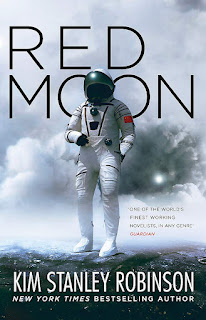Red Moon - Kim Stanley Robinson
What kind of impact with this have? What kind of tensions and issues will arise between the Chinese base on the south pole of the Moon and the USA and rest of the world on the north pole? And not just on the Moon but the nature of influence and domination on the Moon could also have consequences on Earth as well, or vice versa. Well, the beauty of Kim Stanley Robinson is that he takes those questions and projection about our possible future in a direction that we don't often take the time to consider in any kind of realistic depth.
As a result, Red Moon takes on a direction that few who have read his Red Mars trilogy will expect. As far as the matter of colonisation of other planets and off-world habitats, it's a case of been-there-done-that. Red Moon is not about colonisation as much as using human presence on the Moon as a way to explore the balance of powers currently in the world on Earth today and in the near future. The author's depiction of life on the Moon is actually cursory and tangential to the real issues he wants to examine, which might be disappointing for fans of Red Mars.
The characters and the situation that develops as a plot is also somewhat disappointing. We have a Chinese poet Ta Shu who has arrived to consider matters of Feng Shui, which might not seem like the serious hard scientific probing that usually characterises KSR books, but adjustment to an alien environment is more than just a matter of finding a means of providing oxygen, food and water. Quantum physics has a part to play however and that involves Fred Fredericks, a computer specialist who has visited the base to deliver a "mobile quantum key device", an encrypted communication device to Chang Yazu, the chief administrator of the Chinese Lunar authority. Somehow however Fred ends up killing him.
Caught up in a diplomatic incident, Fredericks is quickly returned to Earth in the company of Chan Qi, the pregnant daughter of prominent Politburo member Chan Guoliang. Her pregnancy presents a problem as the risks of giving birth in the reduced gravity of the Moon is as yet unknown. Qi is also an outspoken Maoist and figurehead for a revolutionary group in China that sets itself against Capitalist expansion that has produced deep inequalities and hateful attitudes in the wealthy elite. Qi's activities make her return to Earth of interest to several competing security agencies, as well as a computer scientist developing an AI presence outside the monitoring Great Firewall of the Chinese authorities.
Instead of an exploration of the scientific possibilities and problems involved in the development of colonies and bases on the Moon, for a large part of Red Moon we have a kind of espionage thriller based around a US scientist on the run in rural China with a pregnant Maoist revolutionary in 2048. But there's a kind of parallel symbiosis in this arrangement that is typical of Robinson, a combination of scientific theory and real world politics, a consideration of its application to future crises that humanity may yet confront in the direction in which we are currently travelling.
There are inevitably a lot of other issues that arise in passing and some colourful incidents, including a bizarre free-floating audience participation production on the Moon of Philip Glass's opera Satyagraha. That however is about as far as space opera goes here. Fans of KSR expecting something more in the field of speculative space SF may be disappointed, but again Kim Stanley Robinson is forcing the viewer to put aside preconceptions, move away from a western US-centric view of the world towards a future where China is likely to have a far bigger role to play and a lot of internal issues to grapple with that are likely to have far-reaching consequences.
Unfortunately, I don't think Robinson is the best person to do this and for all his research and in-depth consideration of historical precedents and pressures, too much of Red Moon does retain a westernised perspective on China. The point however is perhaps not so much the Chinese focus as - like his previous work New York 2140 - realising that the current social and economic models are failing and we need to find a better way of rebuilding society. Like much of KSR's work however, how relevant and important Red Moon is will only become apparent much further down the line, and at least there is one writer taking our futures seriously. On a simple level of ideas, character and plotting however, Red Moon is for the most part a repetitive and unexciting read that fails to engage, and that's what is really disappointing here.




Comments
Post a Comment